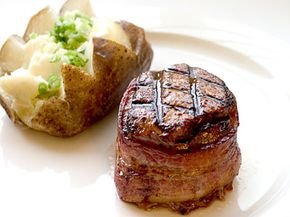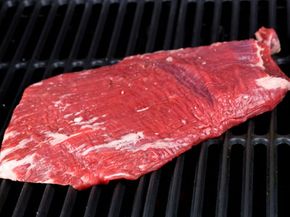“
 “Grilling Steak: A Step-by-Step Image Gallery Sure, she looks friendly enough. But she works at a restaurant, so tread very carefully. See more pictures of grilling steak.Kelly Kline/iStockphoto
“Grilling Steak: A Step-by-Step Image Gallery Sure, she looks friendly enough. But she works at a restaurant, so tread very carefully. See more pictures of grilling steak.Kelly Kline/iStockphoto
One of the great shames of life is that the region of your brain that governs hunger doesn’t communicate with the region of your brain that knows you’re broke. Just because you’re craving a steak doesn’t mean you can afford it, and knowing you can’t afford a juicy porterhouse does nothing to curb your need for one. However, tricks abound for satiating your culinary desires in these dour economic times.
Eating steak on a budget means dealing with some cold, hard facts. For one, forget about ordering one in a restaurant. Market research analysts predict that the food service market in the U.S. will grow at an annual growth rate of close to 6 percent by 2021, so while Americans spend a lot of money of dining out each year, it is possible to recreate high-end meals at home for much less than the cost of an average restaurant meal [source: [Technavio].
How do you save cash by staying home and whipping up the same meal you would’ve ordered at the steak house? After all, in the U.S., restaurants customarily don’t mark up the prices on cuts of meat served as entrées as much as they do other items. In fact, the price of a steak as it appears on a restaurant’s menu may cost only a few dollars more than what the restaurant paid for it. You’re paying for the operating costs that restaurant owners must consider — employee pay and benefits, power bills, maintenance and more — and they must prodigiously mark up certain items to cover these expenses and turn a profit. For example, a side salad may be priced at five or ten times the restaurant’s cost [source: UC Davis]. Extravagances like liquor and dessert are usually marked up several hundred percent [source: Frank].
Since any steak lover would likely throw out any semblance of thrift upon entering, say, Peter Luger’s, you should try avoiding temptation altogether. This doesn’t mean resigning yourself to a lifetime of ground beef. In fact, you can have a restaurant-style meal at home for pennies on the dollar compared to the cost of going to a steak house. The Web site MyRecipes.com found it could match a dinner at the American steak house chain Ruth’s Chris, complete with lobster bisque, iceberg lettuce wedge with blue cheese dressing, dessert and a glass of Cabernet Sauvignon. The restaurant charged $75.45 per person for a New York Strip and two sides, while the at-home version of the same meal cost only $17.30 per person [source: MyRecipes].
Do-it-Yourself Steak: Making the Cut
 “
“ “Filet mignon: worth every effort.Stephen Walls/iStockphoto
“Filet mignon: worth every effort.Stephen Walls/iStockphoto
If recreating a restaurant-style meal at home is so easy and inexpensive, why go to the steak house at all? At Ruth’s Chris, or any other steak house, relaxing and enjoying the company of friends at your table is part of the price. At home, it’s the steak lover on a budget who’s whipping up the blue cheese dressing by himself and hopping into the car for a quick trip to the liquor store to pick up bourbon for the bread pudding. The difference, in other words, is elbow grease. Preparing steak at home cuts costs dramatically, but becoming a savvy and creative shopper and chef can reduce the price of a steak dinner even further.
Where does knowledgeable steak shopping come in handy? Let’s consider the priciest steaks first. Filet mignon is among the best cut of meat any cow has to offer. These steaks come from the very soft, low-fat and tasty tenderloin area. They’re also among the most expensive steaks, but eating steak on a budget doesn’t mean that you have to forgo them altogether. Part of the expense of buying a cut of filet mignon is the trimming that’s required. In most stores and at restaurants, the filet mignon served is cut from the center of the tenderloin. By agreeing to buy the whole section of tenderloin from which the filet mignon is cut, a budget-conscious steak fanatic can really save some dough.
Buying a larger cut of meat to save money doesn’t make much sense, so why buy it? This large section is called a peeled, skinned and muscle side off (PSMO) section of the tenderloin. As the name implies, a great deal — but not all — of the butchering has already been done. Buying a PSMO can cut the price per pound of filet mignon by more than half. Basically, it’s the difference between $9 and $20 per pound at some wholesale clubs [source: Cooking Light]. The PSMO cut of tenderloin is relatively large and can weigh several pounds. Compared to purchasing a pair of pre-cut filets mignon, the cost may even out. The PSMO could be more expensive, but you’ve also bought a lot more meat. In the end, it makes financial sense to spring for the PSMO, especially when you’re throwing a dinner party.
Choose a Lesser Cut of Steak
 “
“ “When grilling flank steak keep a close eye on cooking time, rather than the one beer method of keeping time.Juanmonino/iStockphoto
“When grilling flank steak keep a close eye on cooking time, rather than the one beer method of keeping time.Juanmonino/iStockphoto
If you don’t have a large amount of discretionary income to spend, buying all that steak could easily deplete your bank account. This doesn’t mean you have to give up steak altogether; rather, it merely demands that you become slightly more creative with choosing and preparing cuts of steak. Filet mignon is easy; apart from drastically overcooking it, there are few ways to screw it up. Other cuts of steak may need a little more time and attention to bring them up to snuff in terms of flavor and quality.
On the side of the cow, just above the belly, is the flank, a region of relatively tough meat. Appropriately enough, this is where flank steak comes from. Usually a flank steak is thin — no more than one inch (2.54 centimeters) thick — which presents a challenge in cooking. It is also somewhat tough and lacks a lot of natural flavor because it doesn’t have many fat deposits. This means that flank steaks need extra help in tenderizing and marinating. Using olive oil-based marinades or dry rubs are two ways to loosen up the meat and impart flavor.
How you cook your flank steak also has a great deal to do with how nicely it turns out. Since it’s a comparatively thin cut, flank steak should be cooked in a very controlled precise manner. Grilling this cut is an option, but you should time the cooking very carefully. Searing each side in a pan on the stove and then cooking it the rest of the way for several minutes in a hot oven may be a better method. Either way, flank steak shouldn’t be cooked beyond medium rare to avoid making the steak tough and chewy [source: Luscher].
Another lesser known cut of steak is the flatiron. Like the flank steak, the flatiron is usually inexpensive. It differs from the flank in that it’s actually a length of muscle mass cut from the chuck, which is the shoulder region of the cow. Eating muscle may sound a little strange, sure, but the flatiron is a tender and flavorful cut of steak.
Clearly, there are ways around spending gobs of money you don’t have to satisfy the ravenous desire for a juicy steak. It takes a little extra thought and effort, but steak’s worth it, right?
We’ve got steak recipes and lots more information for you on the next page.
Lots More Information
Related HowStuffWorks Articles
- Top 5 Celebrity Chefs
- How to Make Homemade Baby Food
- How Black Angus Works
- How the Aosta Valley Wine Region Works
- How the Abruzzo Wine Region Works
- How the Campania Wine Region Works
- How the Emilia-Romagna Wine Region Works
- Is wine bad for the prostate?
- What is the most expensive wine – and why?
- How Wine Aerators Work
Sources
- Danze, Tina. "Budget steak: get maximum flavor for minimum money." Dallas Morning News. September 12, 2008. Accessed February 11, 2009
- Dubner, Stephen J. "What’s up with restaurant wine prices?" New York Times. June 15, 2007. Accessed February 11, 2009http://freakonomics.blogs.nytimes.com/2007/06/15/question-of-the-day-whats-up-with-restaurant-wine-prices/
- Foster, Helen. "When you just gotta have it." The Independent. May 11, 2000. http://www.independent.co.uk/life-style/health-and-wellbeing/health-news/when-youve-just-gotta-have-it-715905.html
- Kessler, John. "Flatiron a lesser-known cut of steak with price that hits the spot." Atlanta Journal-Constitution. May 19, 2005. Accessed February 11, 2009http://www.ajc.com/living/content/living/food/kessler/051905.html
- Khanna, Parag. "The globalization of steak." Esquire. August 27, 2008. Accessed February 12, 2009.http://www.esquire.com/features/steak/steak-politics-0908
- Kluger, Jeffrey. "The science of appetite." Accessed February 11, 2009. http://www.time.com/time/specials/2007/article/0,28804,1626795_1627112_1626670-1,00.html
- "Beef cuts: where they come from." Reluctant Gourmet. Accessed February 12, 2009. http://www.reluctantgourmet.com/beef_chart.htm
- "Beef on a budget." Cooking Light. Accessed February 9, 2009. http://www.cookinglight.com/eating-smart/nutrition/beef-on-a-budget-00400000037271/page5.html
- "Food spending." Rural Migration News. July 2000. Accessed February 12, 2009. http://migration.ucdavis.edu/RMN/more.php?id=463_0_5_0
- "Restaurant dining at home." MyRecipes.com. Accessed February 9, 2009. http://www.myrecipes.com/recipes/gallery/0,28548,1868044_1851237_1781484,00.html
- "Science reveals secrets of food craving." Washington Times. October 14, 2007. Accessed February 12, 2009. https://www3.washingtontimes.com/news/2007/oct/14/science32reveals32secrets32of-food32craving/


